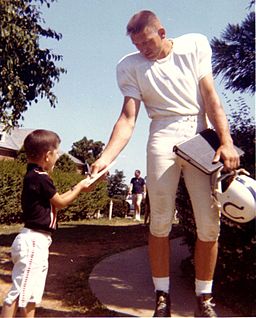A Good Backup
― Muhammad Ali (1942-2016), speaking in 1966 in protest of the military draft.
Nearing the end of another NFL season, it’s easy to see how important a quality backup quarterback can be to a team’s fortunes in making it into the playoffs. Sixteen games, some of them on short rest on Thursdays, takes a toll on starting quarterbacks, especially since teams have become pass oriented in the past thirty or more years. When teams ran more than they passed, which was generally the case until about 1980, quarterbacks didn’t take as much of a beating as they do now. The NFL, as it has too often done, tinkered with the rule book at about that time, changing it to favor the passing game and increase scoring. No more low scoring defensive slug fests, if they could help it. Air Coryell, named for Don Coryell, the head coach of the San Diego Chargers from 1978 to 1986, became the model for a new style of NFL play.

Johnny Unitas signing an autograph at the Baltimore Colts’ Westminster, Maryland training camp in the summer of 1964. Unitas, the starting quarterback for the Colts from the late 1950s to the early 1970s, was often hurt, but his backup many of those years, Earl Morrall, was probably the best in NFL history. Photo by Joel Kaufman.
Comedian Billy Crystal tells a story about Howard Cosell in this 2013 appearance on David Letterman’s late night talk show.
Howard Cosell was a good backup for his viewers against the more real and destructive bombast and arrogance of NFL owners and marketers, as well as other authority figures in sports and in the politics surrounding it. He would have backed up the players protesting police brutality now similarly to the way he backed up Muhammad Ali when Ali refused to comply with the draft. The league doesn’t always look out for the players’ best interests when they make rules changes and schedule expansions out of greed, and it appears no one in the current media has the stature and integrity Howard Cosell had in the late twentieth century, and will as he did back up athletes when they exercise their constitutional rights as citizens.
― Vita

Howard Cosell guest starred as himself on a 1972 episode of the television situation comedy The Odd Couple, with Tony Randall and Jack Klugman. Ironically, Mr. Cosell was at the height of his fame then largely because of his broadcasting duties on Monday Night Football, which started in 1970, inaugurating the bloat of the NFL into the ubiquitous bore it has become today.
